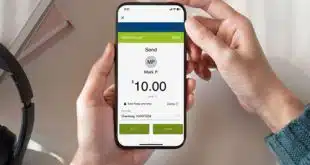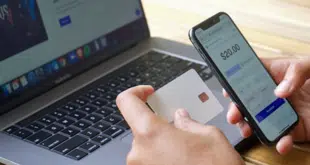Major tech and payments companies are reportedly showing an interest in acquiring Softcard, the troubled mobile-payments joint venture owned by three of the nation’s biggest mobile operators. Google Inc. is in “exclusive” talks with the company and has offered at least $50 million for it, The Wall Street Journal reported Friday evening.
PayPal Inc. has also shown an interest in Softcard, the Journal reported, citing two people familiar with the matter.
Officials at Google and Softcard could not be immediately reached for comment.
Google’s interest is fueled by a sense of urgency created by the early success of Apple Pay, the mobile-payments service launched in October by Apple Inc,, according to the sources who talked to the Journal. By acquiring Softcard, the Mountain View, Calif.-based online search giant could bolster its 3-year-old Google Wallet, which competes with both Softcard and Apple Pay. Google Wallet has struggled to find acceptance among users and merchants since its launch and has undergone at least two revamps.
Dallas-based Softcard, too, has stumbled since its commercial launch in 2012, leading some observers to speculate that its three owners–AT&T, Verizon, and T-Mobile USA–may have concluded the effort is proving more expensive than they originally projected. Early this week, news emerged that the company had laid off 60 employees, at least some of whom had been with the venture for several years.
n
“The carriers are clearly looking to dump a non-performing asset here,” Rick Oglesby, senior analyst at Double Diamond Group, a Centennial, Colo.-based payments consultancy, comments in an email message. “[Fifty million dollars] is far less than they have invested and it reflects the high-risk nature of the effort.”
n
Softcard’s owners have an existing business relationship with Google, which shares revenue with them and other carriers from searches carried out on Android phones and from Google’s Play store, according to the Journal story.
n
But the three telcos have also played hardball with Google, shutting Google Wallet out of their networks to protect Softcard, which until last year was known as Isis. The venture changed its name to avoid association with one of the names used by the Islamic State militants in Iraq and Syria.
n
Like Apple Pay, both Softcard and Google Wallet use near-field communication (NFC) technology to link mobile phones with merchant terminals. Only about 200,000 U.S. merchant locations are equipped for NFC transactions, a limitation that has hobbled both Google Wallet and Softcard, though Google introduced a plastic card linked to Wallet that can be used in stores without NFC readers.
n
Softcard’s business model has relied on a chip inside the phone known as the secure element to lock down users’ card credentials. Google originally followed this model, known as card emulation, but partly because of the carrier boycott it has moved to a cloud-based variant called host card emulation (HCE). This allows issuers to provision credentials without interacting with the secure element, which is usually the phone’s SIM card.
n
This approach is appealing to issuers because it allows them to introduce mobile-payment apps while bypassing access fees levied by the mobile carriers.
n
Observers say a Google-Softcard deal would benefit Google by giving its wallet entrée to new markets that have been closed to it. “I think this pairing makes total sense,” says Oglesby. “It would give Google access to SIM-based NFC systems, which would open up device availability tremendously as well as give Google access to sell its service where carriers have previously worked hard to prevent that. It also removes the carriers from this high-risk business and puts the business in the hands of a provider that has a more engaged and techno-savvy consumer base.”
n
Still, Google will likely have to pour considerable resources into Softcard to make the combination work. “While the pairing makes sense in a lot of ways, Google will need to make many changes and additional investments to be successful, and this price tag reflects that,” notes Oglesby.
Besides in-store transactions, Google Wallet also allows users to send cash to anyone with an email address via the Wallet app or Gmail. It also permits online payments at sites with the “Buy With Google” button, such as Airbnb, Uber, Travelocity, and Rue La La.





